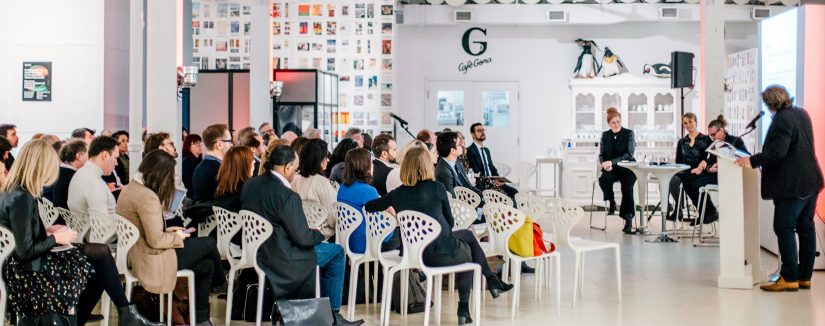
Photo © Camille Gladu-Drouin
On October 25, 2018, the Coalition for the Diversity of Cultural Expressions celebrated its 20th anniversary in Montreal. Its members were present as well as the many personalities who contributed to its development.
Organized in two parts, a conference followed by a reception, the event allowed the CDCE to reaffirm its priorities and review the highlights of its history.
Opened by Bill Skolnik, Co-Chair of the CDEC, Kelly Beaton, Acting Director General, Creative Market and Innovation, Canadian Heritage, and Ian Morissette, Assistant Deputy Minister, Policy and Crown Corporations, Ministry of Culture and Communications of Quebec, the conference was an opportunity for the CDCE to address three themes at the heart of current issues for the diversity of cultural expressions.
A first panel “Evaluating the Diversity of Cultural Expressions in the Digital Age” was to guide the CDEC’s work on measuring the diversity of online cultural expressions, so that it could propose effective reforms and promote the influence strategies of cultural sector actors. The first observation is that there is a decrease in data every year. Patrick Joly indicated that 60% of the data related to the sale of books in French are currently available. The panelists, Jean-Robert Bisaillon, Patrick Joly and Josée Plamondon, stressed the importance of descriptive data to activate the discoverability of cultural content and, possibly, to measure the diversity of online cultural expressions. The various cultural sectors are not all at the same point, but the process is underway. The growing presence of transnational platforms raises the question of the development of international standards. The development of digital tools has significant potential for the sector, as demonstrated by the experience of the Quartier des spectacles partnership. Personal data protection issues and the reluctance of companies to share their data are aspects that constantly come up when it comes to usage data.
Secondly, Nathalie Guay presented the reflection initiated by the CDCE on the need for cultural ethics in the development of artificial intelligence (AI). AI interacts with cultural content in several ways, at the level of recommendation algorithms but also at the level of creative processes. While some developments present interesting opportunities – one can think of the potential of discoverability for niche content – others have negative consequences and raise many concerns, not only for creators but also for society in general: standardization of taste, lower remuneration, loss of control over personal data, increased investment to ensure discoverability, etc. For the CDCE, it is essential that the development of AI be guided by ethical principles, in particular that of the diversity of cultural expressions.
The last panel brought together the international guests of the International Federation of Coalitions for Cultural Diversity, which met in congress on October 26 and 27 in Montreal. Among them, Guillaume Prieur for France, Ray Argall for Australia, Mane Nett for Chile and Kodjo Noussouglo for Togo. Véronique Guèvremont, of the UNESCO Chair on the Diversity of Cultural Expressions, opened the discussion on initiatives (regulations, agreements, pilot projects) implemented around the world to defend cultural diversity in a context of dematerialization of cultural goods and services. She noted that the initiatives to date are not yet up to the challenges of protecting and promoting the diversity of cultural expressions, some advocating the adaptation of artists, creators and producers to digital technology and others focusing only on adjusting tax models. The European Union is truly the region with the most significant progress, particularly with the Audiovisual Media Services Directive (AMS), which sets quotas for the exposure of European works on video-on-demand platforms and investment obligations for European creation. This is in stark contrast to the situation in Africa, where barely 2% of cultural content is African, even in traditional media.
During the reception that followed, several prominent figures from the political and cultural sectors took the floor to highlight the work accomplished by the CDCE over the past twenty years: the Honourable Pablo Rodriguez, Minister of Canadian Heritage, the Honourable Sheila Copps, former Minister of Canadian Heritage, Louise Beaudoin, former Minister of Culture and Communications, and then International Relations of Quebec, Solange Drouin, Co-Chair of the CDCE, Pierre Curzi, First President of the CDCE, and Robert Pilon, First Executive Vice-President of the CDCE.
Through their testimonies, the history of the Coalition has been retraced: its creation by the main Quebec cultural associations in the spring of 1998; the enlargement as early as 1999 to the main professional associations of the cultural sector in Canada; the campaign in the 2000s for the recognition of the symbolic value of cultural goods and services; the adoption in 2005 of the UNESCO Convention on the Protection and Promotion of the Diversity of Cultural Expressions; the efforts in the following years to convince cultural professionals from all continents to create their own coalition; the daily work, yesterday and today, with the thirty active members, to protect and promote the diversity of cultural expressions, in Canada and around the world.
Through their presence and involvement in the debates, the members and partners of the CDCE expressed their willingness to continue the mobilization. In a context marked by the revision of the laws on broadcasting, telecommunications, radiocommunication, as well as the law on copyright, several voices were raised to highlight the importance of a change in the legislative framework concerning the financing and the dissemination of cultural content in Canada.
The event attracted a wider audience than the only networks of the CDCE, proof if any were needed, that the issue of the diversity of cultural expressions does not only concern cultural industries but also society as a whole.